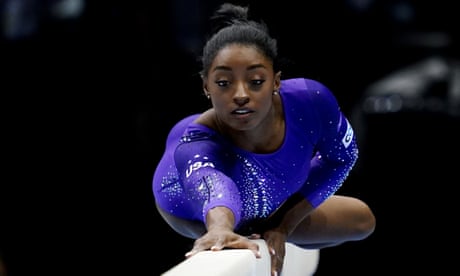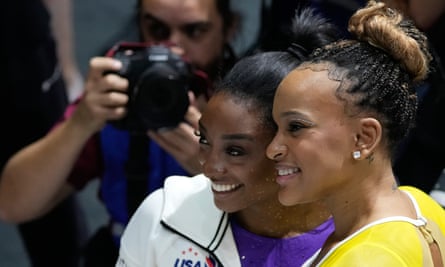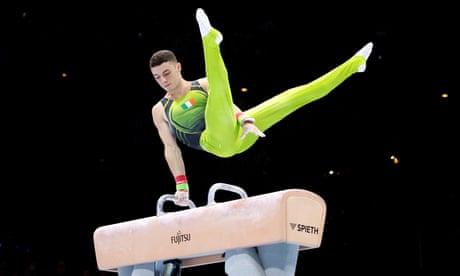
Betsy Reed | Editor, Guardian US
In the aftermath of an astounding comeback in which she won four gold medals and a silver after a two-year international absence, Simone Biles had every reason to celebrate her renewed dominance and a historic performance that marked her as the most decorated gymnast of all time.
Instead, as she faced up to the press on Sunday evening at the Artistic Gymnastics World Championships in Antwerp, Biles was firm. She did not care about the medals.
“I had to prove to myself that I could still get out here, twist,” she said. “I could prove all the haters wrong, that I’m not a quitter, this, that and the other. For me, I didn’t care. As long as I’m out there twisting again and finding the joy for gymnastics again, who cares?”

Two years ago, when she was forced to withdraw from the Olympics after suffering from the “twisties”, completely losing her air awareness, Biles retreated from the sport. Even this year, she was unsure that she would return to gymnastics. As she worked hard to address her deteriorated mental health, she embraced therapy, focusing on living in the moment rather than looking ahead. She has learned how to sometimes say “no”.
The joy that Biles was able to compete with throughout the event was her biggest triumph of all. By advocating for herself and having the clarity to prioritise her mental and physical health during one of the most important moments of her career, Biles has likely prolonged her career. Her decisions over the last two years will have a greater lasting impact both within and beyond her sport than any peerless new skill.
Such was Biles’s determination to remain in the moment and not look ahead, she has been hesitant to even mention the Paris Olympics since she returned to competition. Still, the obvious consequence of the results in Antwerp is that Biles has re-established herself as the dominant force in the sport right as Paris approaches.
But she is not the only star. Brazil’s Rebeca Andrade shared all five podiums with Biles in Antwerp, and it was thrilling to see the 24-year-old push the best gymnast in the world with the promise that there is more to come. Biles genuinely seemed to enjoy the presence of a worthy rival. While they competed fiercely, both athletes were gracious and thoughtful throughout. After the event, Biles and Andrade danced at the post-event gala.
Older gymnasts will continue to dominate the pre-Paris narratives. Gabby Douglas, the 2012 Olympic all-around champion, announced in July that she is back in training and planning to return in 2024 having not competed since the Rio Olympics. The relentless criticism and abuse from both the 2012 and 2016 Olympic Games also had a destructive effect on Douglas’s mental health, leading to a far longer retreat from the sport.

Eight years is a long time between competitions, but Douglas is only a year older than Biles and the 27-year-old is so talented that it will be taken seriously. Sunisa Lee, the all-around champion in Tokyo, will also attempt to return to a second Olympics after serious kidney issues this year.
After such incredible performances in Tokyo and then last year in Liverpool, Antwerp proved to be a disappointing outing for British gymnasts until Jake Jarman produced an incredible vaulting performance on the final day. Jarman has been capable of astonishingly difficult skills for a long time yet things are coming together. The 21-year-old is now armed with the confidence of being a world champion and he continues to improve as an all-around gymnast.
Despite his fall in the pommel horse final, Max Whitlock’s performances in Antwerp made it clear that he will be in the fight as he attempts to defend his Olympic gold-medal on the pommel horse for a third time. The contest for gold with the clean, elegant Rhys McClenaghan of Ireland, now a two-time world champion, will be one of the highlights of the event.

Meanwhile, Alice Kinsella performed admirably to finish seventh in the women’s all-around final after learning of Jessica Gadirova’s injury withdrawal just minutes before the final was to begin and the women will be competing for another team medal in Paris. Antwerp did, however, underline that Gadirova remains their only consistent individual medal threat. Considering she qualified third in the all-around and for four of the five individual finals, she is a damn good one.
If women’s gymnastics continues to trend towards older, longer careers, men’s gymnastics is the youngest it has been in years. Daiki Hashimoto continued his dominance by consolidating his status as the first teenage men’s Olympic all-around champion by winning his second world title at 23. However, last year’s champion, 23-year-old Zhang Boheng, opted not to compete in Antwerp. Instead, he won the Asian Games just over a week earlier, scoring more than three points higher than Hashimoto. Their battle in Paris will be enormous.
I hope you appreciated this article. Before you move on, I was hoping you would consider taking the step of supporting the Guardian’s journalism.